10 Ways to Find a Good Local Rat Breeder or Rescue
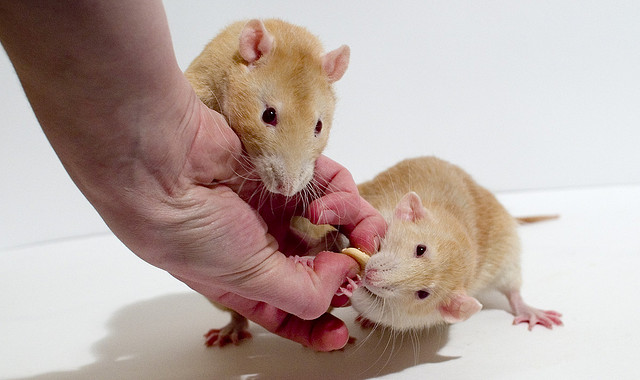
10 Ways to Find a Good Local Rat Breeder or Rescue
Finding a good breeder is the best way to find healthy, happy animals. Rats should not be obtained from poor sources, such as feeder breeders, commercial farms, or pet stores. These sources don’t put health or disposition as main priorities; they are only looking for profits. Pet rats make wonderful pets, but the wrong animals can become a complete nightmare if they turn out to be highly aggressive!
Do They Sell Feeder Rats?
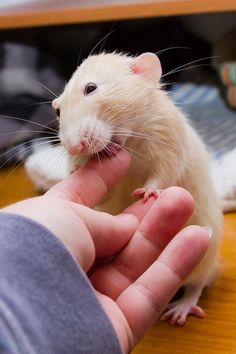 If a breeder is raising feeder rats, it is best to avoid purchasing any animal from them. It usually means they are not very concerned with their animals’ health. In order to find out if a breeder raises feeder animals, contact them through their ads or website and inquire. Let them know you really need 4 or 5 feeder animals and are willing to pay a premium price for healthy rats. If they say yes, it’s a no go!!!! They are clearly running a “for-profit” rattery (these usually don’t last long anyways), which is bad for the adopter.
If a breeder is raising feeder rats, it is best to avoid purchasing any animal from them. It usually means they are not very concerned with their animals’ health. In order to find out if a breeder raises feeder animals, contact them through their ads or website and inquire. Let them know you really need 4 or 5 feeder animals and are willing to pay a premium price for healthy rats. If they say yes, it’s a no go!!!! They are clearly running a “for-profit” rattery (these usually don’t last long anyways), which is bad for the adopter.
What Types of Cages Does the Breeder Use?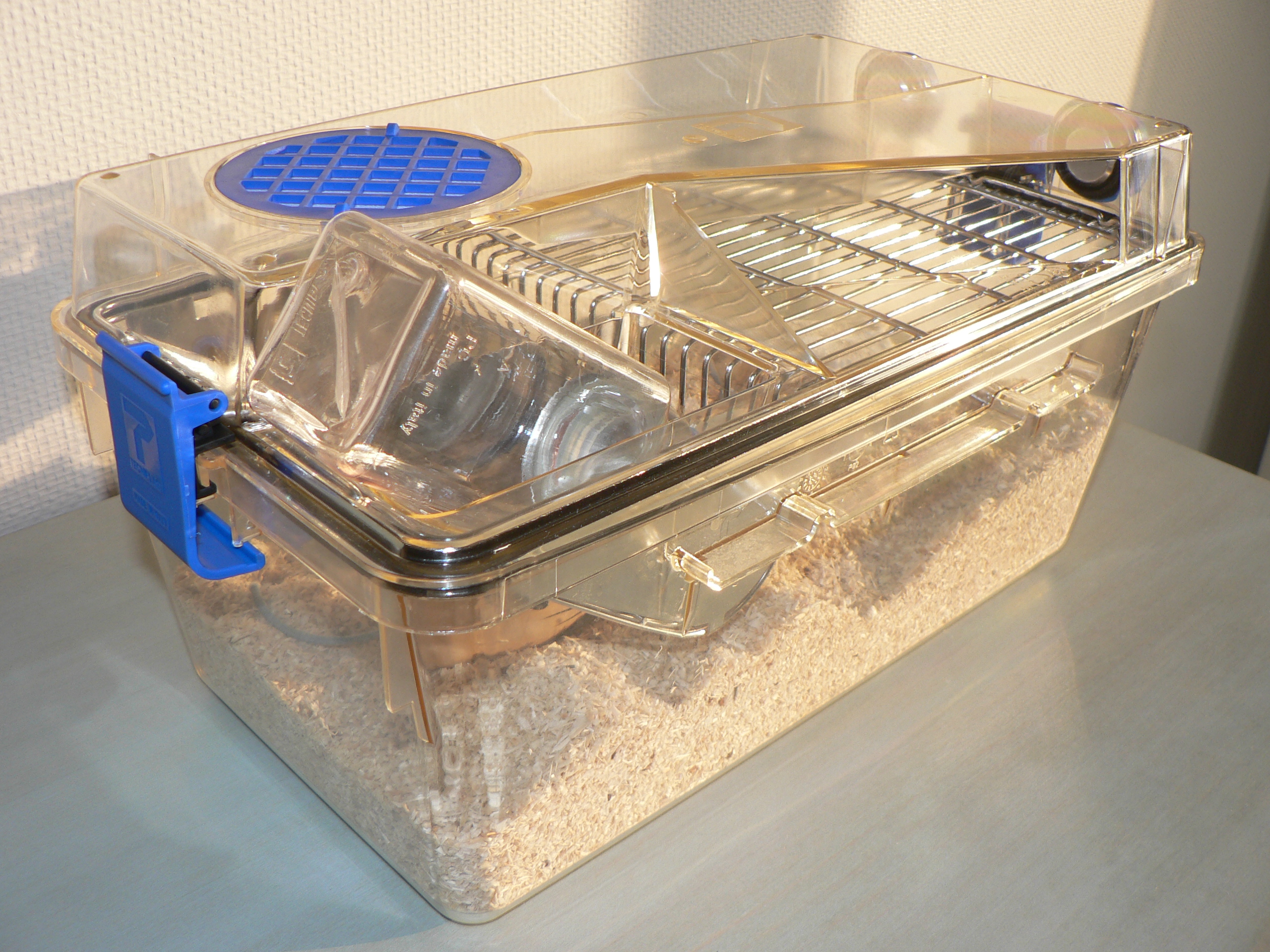
The cages that the rat breeder houses his or her rats in is important. There should be plenty of space in the main male and female housing units (separating sexes so no one produces an oops litter), there should be no rat racks, every mother should have her own maternity cage, and rats should not be bred 3 or more at a time in a cage. Cages should have plenty of air flow as well.
Aquariums are commonly used by bad breeders, as you can get an aquarium and a lid for under $20. Sometimes, you can get them as cheap as $5! They don’t allow for much air flow, putting the rats at risk for different illnesses. In addition, there should be no wire floors or ramps in the cage. Wire flooring can severely injure pet rats, so be sure to check for that when adopting. Bumble foot is no laughing matter.
Are Rat Racks Involved?
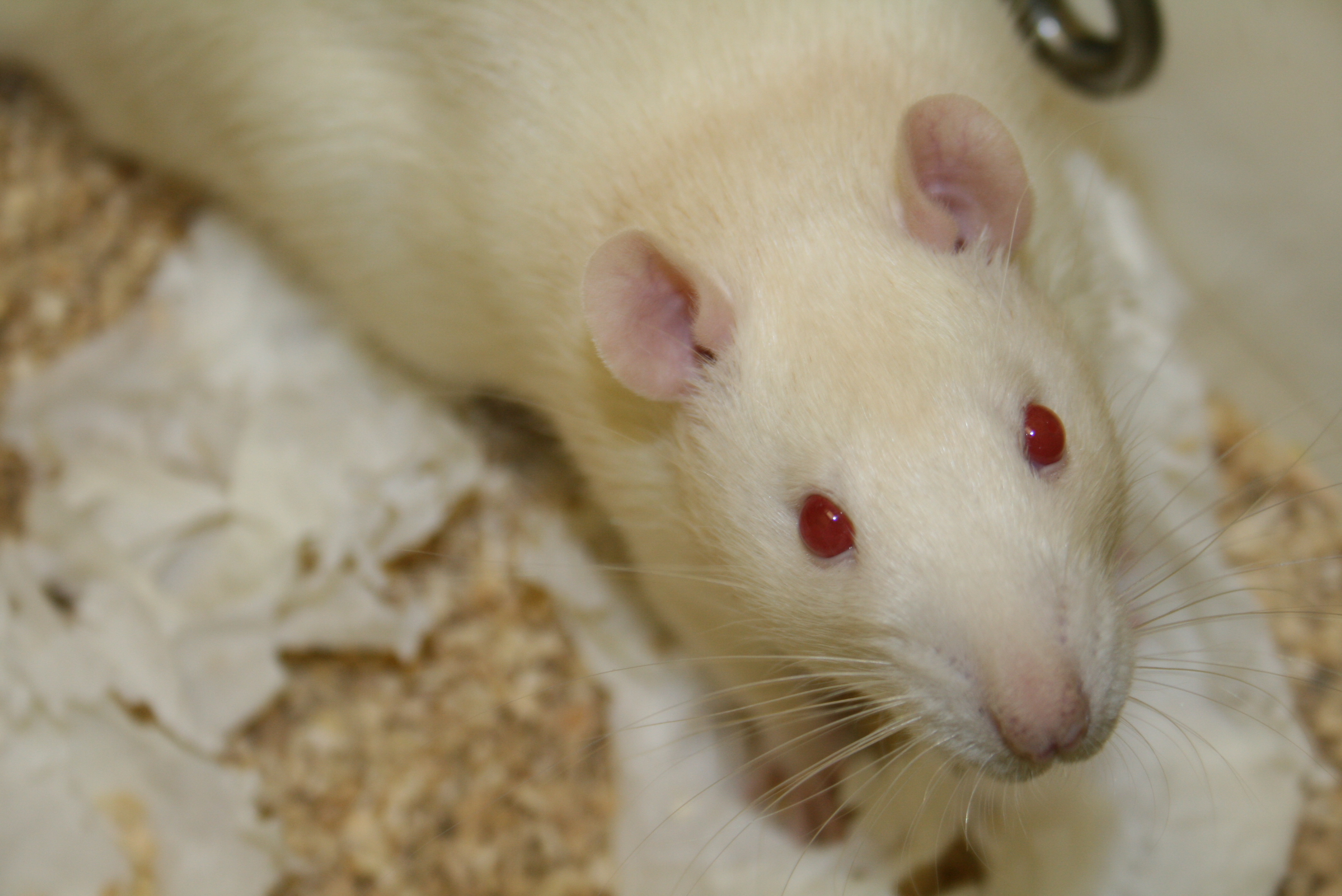 Rat racks. These are some of the worst housing units there are for pet rats. In many cases, these rat racks are used improperly as well! A rat rack is a multi-cage unit comprised of 8 or more small tubs, or trays. These individual tubs slide in and out for easy access. They’re about the size of a 5 or 10 gallon aquarium usually; and are completely dark in most models. Most owners use pine or cedar bedding in these things, and it blows my mind that they cannot see how sick these tubs will make them. If you suspect a feeder breeder, ask to see the rats’ setup.
Rat racks. These are some of the worst housing units there are for pet rats. In many cases, these rat racks are used improperly as well! A rat rack is a multi-cage unit comprised of 8 or more small tubs, or trays. These individual tubs slide in and out for easy access. They’re about the size of a 5 or 10 gallon aquarium usually; and are completely dark in most models. Most owners use pine or cedar bedding in these things, and it blows my mind that they cannot see how sick these tubs will make them. If you suspect a feeder breeder, ask to see the rats’ setup.
Does the Breeder Show You Sick or Underweight Animals?
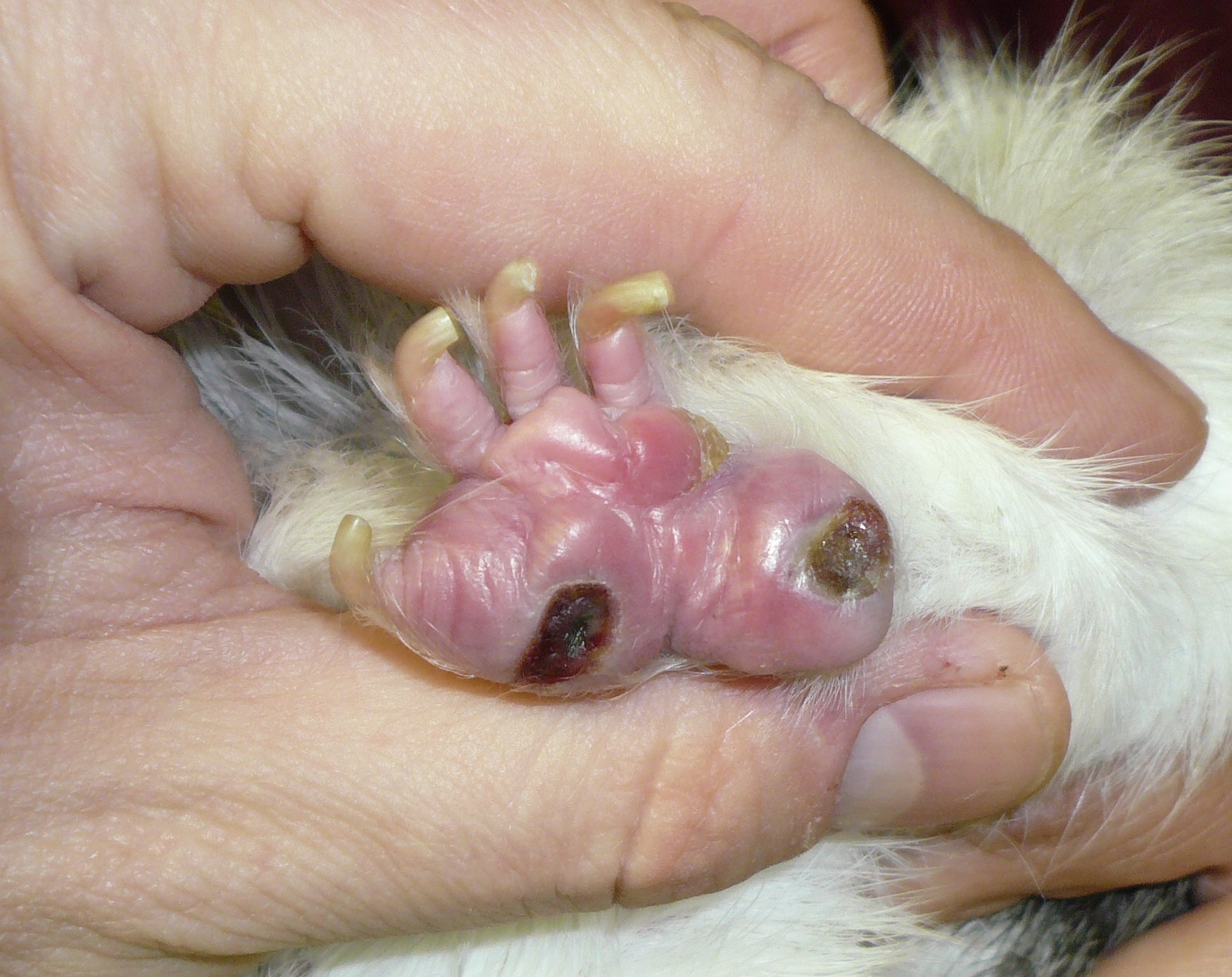
this is a guinea pig, but it is exactly the same as rat bumble foot. Very gross, very painful, and very difficult for a rat to go through.
If the breeder presents you with sick, underfed, malnourished, or otherwise poorly looking animals, don’t turn them down if you can get the animals for free. Flat out refuse to pay for the animals, but offer to rescue them. Never sponsor someone who isn’t taking care of the animals that they are selling. While it seems bad to let the animals stay in that person’s care, it’s even worse to give them money to encourage them to continue to raise the animals.
What Type of Feed Does the Breeder Use?
There are several recommended formulas out there, including Oxbow. There are even wonderful home mixes that can be made. However, beware of ANY breeder who feeds their animals solely dog food, seed rat mix, hamster mix, or bird seed. These poor animals will be in a very malnourished state, and likely in poor health.
What Kind of Bedding Is Used with the Animals?
There are several different kinds of bedding out there. The most important beddings to avoid are wood, especially cedar. Some breeders, rescuers, and owners feel Aspen and other wood beddings are OK. I don’t feel that way, and I don’t recommend them to my readers. The toxins in cedar bedding are known to kill, and almost every rat owner is well aware of the dangers. Wood bedding is the cheapest type of bedding you can get, other than trashed newspapers which are free. This makes it a prime, steady source of bedding for the less concerned feeder breeder. So of course, wood bedding breeder is not the breeder for you!
As some of you already know, I definitely have my own personal favorites for bedding. Any recycled paper bedding seems worthy as litter, and there is even the option of going with fleece liners. I scream “CAREFRESH!” but that’s just my recommended rat bedding.
Are There Any Bad Reviews of the Breeder or His or Her Practices Online?
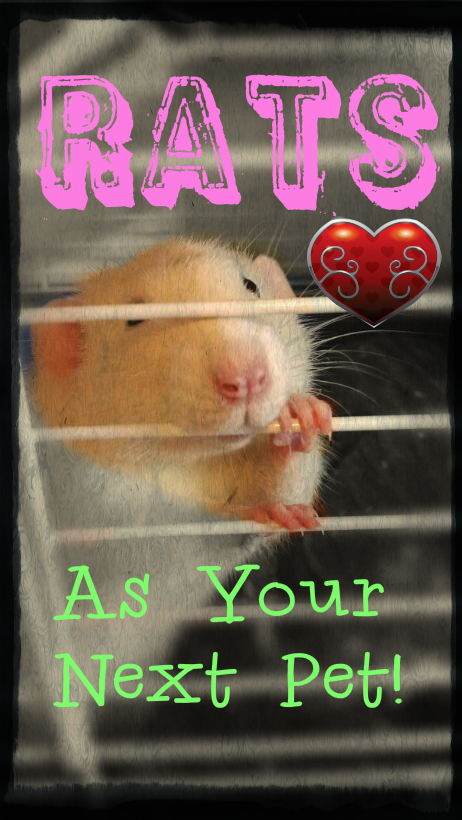 The internet hosts a wealth of information; and you should use it to your advantage. Try googling the breeder’s name, city/state, rattery name, and more to try to find any websites, ads, Facebook pages or profiles, and more. You might be surprised at what you learn about a breeder through the internet. Now, this does not go without saying that there ARE some scam artists and bad people out there who are just trying to wreck a reputation. 1 bad feedback is okay, 2 is a red flag, and 3 means there is probably something afoot. ESPECIALLY if the different comments are all a few months apart.
The internet hosts a wealth of information; and you should use it to your advantage. Try googling the breeder’s name, city/state, rattery name, and more to try to find any websites, ads, Facebook pages or profiles, and more. You might be surprised at what you learn about a breeder through the internet. Now, this does not go without saying that there ARE some scam artists and bad people out there who are just trying to wreck a reputation. 1 bad feedback is okay, 2 is a red flag, and 3 means there is probably something afoot. ESPECIALLY if the different comments are all a few months apart.
Is the Breeder Overly Concerned About the Adoption Fee/Profit?
Some breeders are all about the profits. If a breeder is more concerned about telling YOU what you have to pay rather than answering YOUR questions about their health and care, then it’s a for profit or a feeder breeder. A standard breeder breeds as a hobby and passion; an income earned off of the babies is usually only going to mildly help the food budget of the rats. A true breeder DOES NOT turn a profit, as it’s nearly impossible to do so.
Does the Breeder Have Answers to Simple Rat Care Questions?
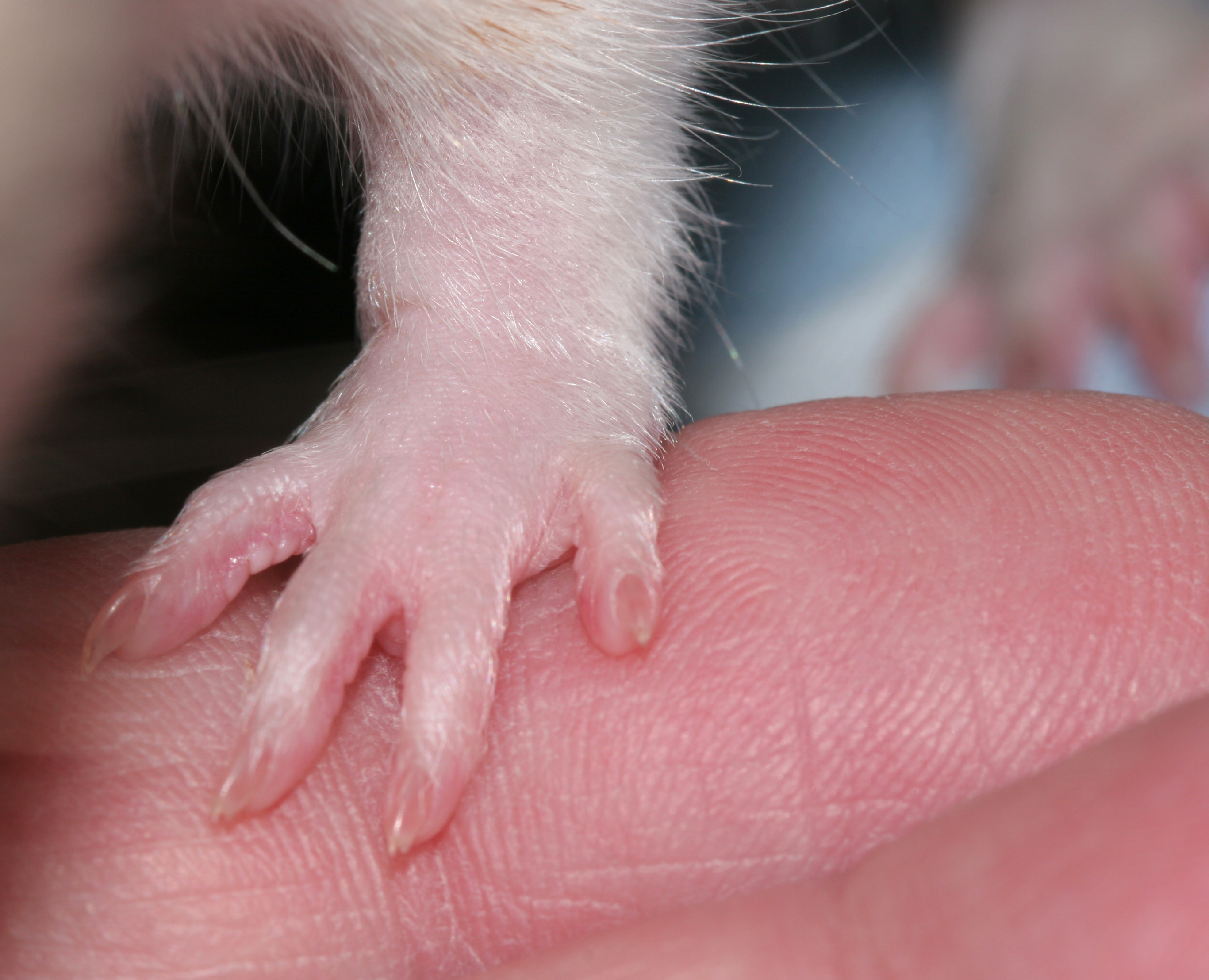 If the breeder cannot answer simple questions regarding the animals’ care, check elsewhere. Try asking the below questions; if they miss more than 2, find another breeder. Although, I’d find a different breeder if they missed ANY of them. (I am a breeder, as you all know. Therefore, I feel if someone can’t answer these super easy questions, they’ve no business breeding them until they have learned about them as a species. Oops litters in family settings are a different story; it happens.)
If the breeder cannot answer simple questions regarding the animals’ care, check elsewhere. Try asking the below questions; if they miss more than 2, find another breeder. Although, I’d find a different breeder if they missed ANY of them. (I am a breeder, as you all know. Therefore, I feel if someone can’t answer these super easy questions, they’ve no business breeding them until they have learned about them as a species. Oops litters in family settings are a different story; it happens.)
- What bedding is safe for rats?
- What type of food is best for rats?
- How early do litter mates have to be separated?
- Is an aquarium a suitable cage?
- What’s the proper way to pick up a rat?
Does the Breeder Have a Health Record of His or Her Animals?
Most breeders have a record of their animals’ health. If nothing else, they should have a memory of the different illnesses or health conditions that have afflicted their animals. Sometimes, breeders are excessively lucky and nothing has popped up; but that is HIGHLY unlikely. Almost every breeder has faced a case of mammary tumors, sever myco flares, mites, blindness, abscesses, and more. It’s just all a part of raising ratties. They are simply prone to particular health issues. Ask about the line that you are adopting from, letting the breeder know that you just want to know what to expect genetics wise; especially if your rat ever breeds (whether it be on purpose or an oops litter; better to have the knowledge than neglect it!)